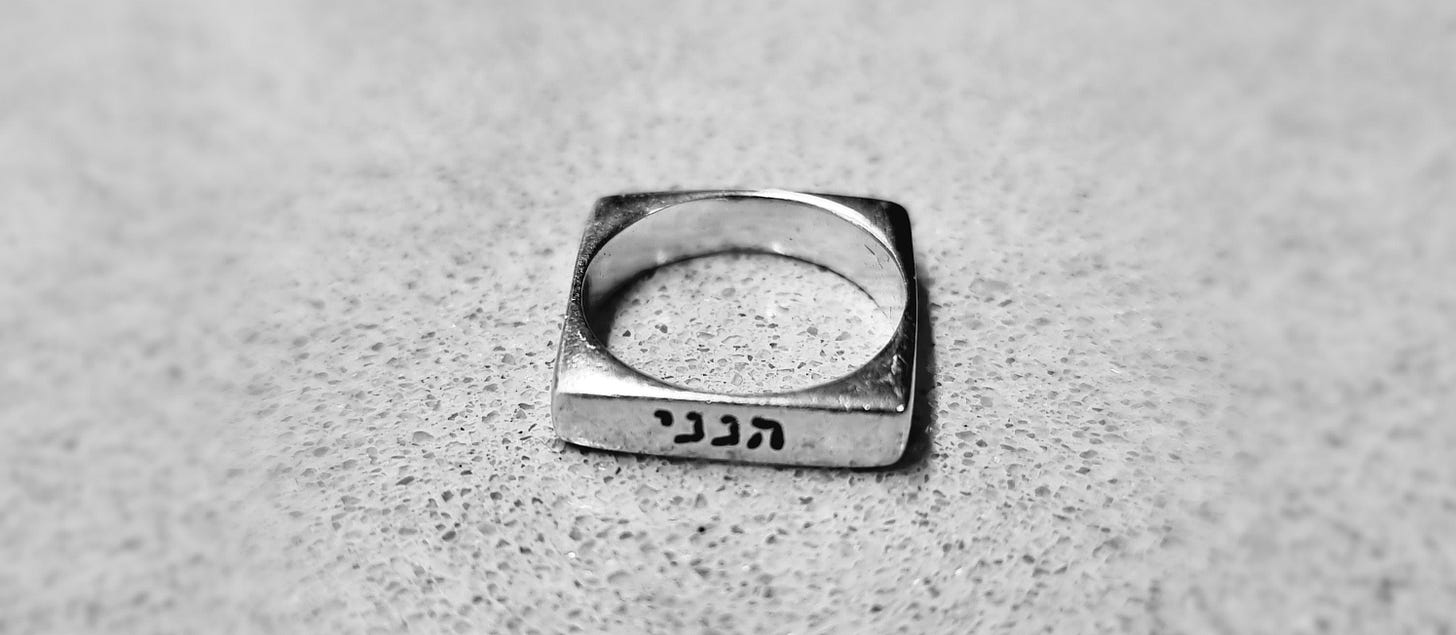I am a California native, but now I live on a hill perched between the Jezreel Valley and the Lower Galilee in Northern Israel, or what Christian tourists (when we used to have tourists before Covid and the War) call “the Land of Jesus,” and rightly so, since apparently, he used to live around here.
I have lived in Israel for thirteen years. This is how I got here. In the past dozen-plus years of my life in the Middle East there have been several mini-wars, terrorist attacks, severe dust storms, withering heat, pouring rain, beautiful, fresh Mediterranean food, coexistence with my Palestinian and Bedouin neighbors, and finding out whether the new BIG Shopping Center in Migdal HaEmek is worth checking out.
It was in Israel that I met my soulmate, Gidon Lev, and wrote two books. It was here in Israel that I experienced the mysteries, aches, and seismic shifts of menopause and also met friends I feel I’ve known my whole life. Here, in this fraught land, I have gazed upon Roman ruins and roamed over tells with layers of civilization dating back ten thousand years. I have gotten parking tickets and learned to distinguish between the siren which means it’s Yom HaShoah (Holocaust Remembrance Day in Israel), and the siren which means you need to run – fast. Only months ago, I watched my bedroom curtains suck outward ominously, slowly, before the massive blast of a missile from Iran exploded in the sky over our home.
October 7th, 2023 was the most catastrophic, devastating attack on Israel in its history. Since October 8th, I have watched as my adopted country has been excoriated, hated, and maligned. I have watched as my adopted country has made stupid decisions. I have also seen grace, courage, dissent, despair, unity, and humor among my fellow Israelis. We have to carry on. There is no other choice.
I haven’t yet written publically about October 7th and the “conflict” in Israel, or what people sometimes quaintly call “Ha matsav” (the situation) because I have been veritably speechless on the subject for five hundred and thirty-one days. And counting.
I read all the news from all the sources, listen to all the podcasts. I feel like a stained, chipped teacup someone left out on the sidewalk.
My daily life is peppered and punctured, like a tin can candle decoration from first grade with inexplicable booms that shake the house, with rocket reports of attacks in Tel Aviv and Jerusalem and fighter jets that fly so low I can see their metallic gleam and blinking red light on the tail. But of course, my life, much like yours, is also full of the mundane: paperwork, unanswered emails, grocery shopping, and, most recently, caring for Gidon.
Before the truce with Hezbollah, I didn’t drive further than the next town over to shop. When I did, I mentally rehearsed what to do if the rocket attack sirens were to go off:
Take your foot off the gas, pull over to the side, turn off the car, run as far as possible, and hit the dirt.
Luckily, thus far, I have not been driving during an attack. Even with the truce, I am on alert all the time. Remember the mysterious house-shaking booms and fighter jets? Remember the hostages – the Israeli humans still shackled in tunnels?
When you are an expat, your home country is your Get Out of Jail Free card. I wouldn’t go anywhere without Gidon anyway, but my home country isn’t looking so good.
Which is worse, I ask myself increasingly – living in a country where rockets are raining down, and democracy is under threat, or a country where everybody is armed to the teeth and democracy is under threat? This unanswerable question makes me to turn inward and focus on what’s right in front of me.
I do the laundry, make bread, knit things and write.
Early in our relationship, Gidon gave me a ring made by a Yemenite silversmith in Jerusalem. It has four corners, this ring. On one side, there is a heart. On another, the date. On another, Gidon’s name, in Hebrew. And on the fourth side, the word hineni – הנני
Gidon has a tic; in public spaces, he glances around quickly, almost furtively, to see what is happening around him, what other people are doing, what they are looking at, and what’s going on. He looks for the exit, he looks for safety, he looks for clues. I suspect that this comes from his four years in a concentration camp when following the cues was a matter of life or death. Or maybe a new friend or a half-rotten potato.
Roughly translated, hineni means “here I am,” or maybe another way to say it is “count me in” or, in our modern parlance, “I’m here for this.” It is how Gidon has lived his whole life – with both feet firmly on the ground, no matter the circumstances. He doesn’t wish things were otherwise; he deals with what is in front of him: threats and opportunities both.
During these times of threats and opportunities, I strive to notice, to write, love, laugh, and cry. It’s all I can do.






Thank you for your words Julie. You ring true. You resonate.. you seem to always resonate with me. Hineni🩵🤍🩵🤍🩵
Thank You Julie for sharing. I also feel like my home country is no longer an option. Guess we're in this for the long haul. Hugs to you both.